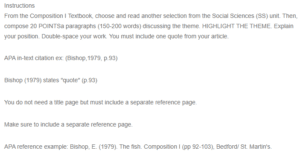Too Hard Not to Cheat in the Internet Age?
The main theme of the article titled “Too Hard Not to Cheat in the Internet Age?” by Elizabeth Minkel is plagiarism. Accordingly, the author of this book highlights Minkel’s article, which had been published in a popular magazine, the New Yorker. Consistently, Minkel criticized another article written in the New York Times titled “Plagiarism Lines Blur for Students in the Digital Age (Minkel, 2010, p.202). In the article, Minkel criticizes the New York Times article for excusing students of plagiarism by claiming that students do not know the distinction between producing original work based on verifiable information and simply copy-pasting or making a few alterations and then claiming the work to be theirs.
Minkel lists two types of students who are involved in plagiarism. Minkel (2010) states, “There are only two types of people pulling these excuses: the crafty, using the Digital Age argument to their advantage, and the completely clueless, who, like plenty in preceding generations, just don’t understand the concept of plagiarism” (p.203). The Digital Argument that students use is that today, a lot of information that was previously only found in books is easily available on the internet, and as such, any knowledge found on the internet should be considered common knowledge. Accordingly, having common knowledge means that people are bound to write the same thing. Minkel heavily criticizes these excuses for plagiarism and says that they only teach students how to cheat in their schoolwork and not get caught (Minkel, 2010). She further emphasizes the importance of teaching students how to produce original work.
My perspective on plagiarism is similar to that of Elizabeth Minkel. It is wrong to take someone else’s hard-earned work and claim it as one’s own work. A perfect example is that Minkel gives; an artist cannot take another artist’s work, claim it as their own, and then profit from it because it is illegal. Just because the lyrics of a song are everywhere on the internet and are common knowledge, it does not mean that another artist can use the same lyrics. This same standard should be applied to academic work.
References
Minkel, E. (2010). Too Hard Not to Cheat in the Internet Age? Composition I (pp 202-203), Bedford/ St. Martin’s.
ORDER A PLAGIARISM-FREE PAPER HERE
We’ll write everything from scratch
Question 
Instructions
From the Composition I Textbook, choose and read another selection from the Social Sciences (SS) unit. Then, compose 20 POINTSa paragraphs (150-200 words) discussing the theme. HIGHLIGHT THE THEME. Explain your position. Double-space your work. You must include one quote from your article.

Too Hard Not to Cheat in the Internet Age.
APA in-text citation ex: (Bishop,1979, p.93)
Bishop (1979) states “quote” (p.93)
You do not need a title page but must include a separate reference page.
Make sure to include a separate reference page.
APA reference example: Bishop, E. (1979). The fish. Composition I (pp 92-103), Bedford/ St. Martin’s.